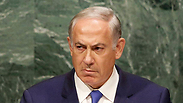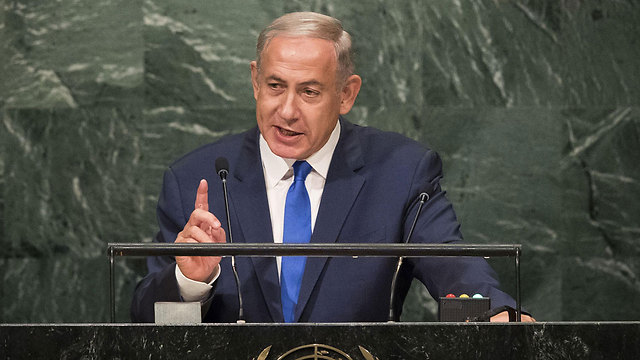
File photo
צילום: AP
What's new in Assadistan?
Analysis: In this year's UN speech, Netanyahu will once again focus on Iran, but instead of the nuclear threat it would be Iran's entrenchment in Syria at the forefront of his mind. But the situation is more complex than what the prime minister describes, with Syria reducing the number of Iranians in its territory and Rouhani being more preoccupied with rehabilitating Iran's economy.
The topic dominating Netanyahu's annual speech at the UN General Assembly this year is going to be Iran. But instead of nuclear Iran, he will talk about Iran's takeover of Syria. The Iranians are on the borders; the Iranians are in the sea; the Iranians are creating territorial contiguity—from Tehran to Beirut. In just a little bit, the State of Israel is going to face annihilation. The next holocaust is coming; save us.
 The situation on the ground does not point to Iranian takeover. On the contrary: Syria reduced the number of Iranians in its territory and their presences in the conflict areas. The mercenaries Iran recruited in Pakistan, Afghanistan and Iraq are mostly fighting in the Idlib area, which is currently under rebel control. Idlib is in northern Syria, hundreds of kilometers away from the Golan Heights.
The situation on the ground does not point to Iranian takeover. On the contrary: Syria reduced the number of Iranians in its territory and their presences in the conflict areas. The mercenaries Iran recruited in Pakistan, Afghanistan and Iraq are mostly fighting in the Idlib area, which is currently under rebel control. Idlib is in northern Syria, hundreds of kilometers away from the Golan Heights.
 Israel is pushing for an agreement in Syria that would include the evacuation of all foreign forces from the country. That is what Netanyahu told Putin in their latest meeting. Putin agrees, because it serves his interests: He would be all too happy to pull all of his forces out of Syria, on the condition Russian presence would continue at a base Assad put at Moscow's disposal in Tartus.
Israel is pushing for an agreement in Syria that would include the evacuation of all foreign forces from the country. That is what Netanyahu told Putin in their latest meeting. Putin agrees, because it serves his interests: He would be all too happy to pull all of his forces out of Syria, on the condition Russian presence would continue at a base Assad put at Moscow's disposal in Tartus.
 Two issues are currently bothering Israel vis-à-vis Iran and Syria: Precision-guided munitions—meaning missiles—and massive Iranian military presence close to the Syria-Israel border. Israel has an answer to both of these problems. What is required here is a combination of military diplomacy, intelligence work, military operations and psychological warfare. Ongoing operations could prevent a war.
Two issues are currently bothering Israel vis-à-vis Iran and Syria: Precision-guided munitions—meaning missiles—and massive Iranian military presence close to the Syria-Israel border. Israel has an answer to both of these problems. What is required here is a combination of military diplomacy, intelligence work, military operations and psychological warfare. Ongoing operations could prevent a war.
 There is no missile factory in Lebanon. There are ideas and plans. Lebanese Prime Minister Hariri is not enthusiastic about the idea, and he's not the only one. Israel could foil these plans if it carries out the necessary military operations and employs the right tactics with the Lebanese leadership.
There is no missile factory in Lebanon. There are ideas and plans. Lebanese Prime Minister Hariri is not enthusiastic about the idea, and he's not the only one. Israel could foil these plans if it carries out the necessary military operations and employs the right tactics with the Lebanese leadership.
 Israel has no intention to create a security buffer zone inside Syria, similar to what it had in southern Lebanon until 2000. Instead it created an influence zone along the border with Syria. The concept of an influence zone is nebulous. It would be interesting to see if it could be maintained over time.
Israel has no intention to create a security buffer zone inside Syria, similar to what it had in southern Lebanon until 2000. Instead it created an influence zone along the border with Syria. The concept of an influence zone is nebulous. It would be interesting to see if it could be maintained over time.
Not exactly. According to official, non-political sources I've spoken to in recent days, the assessments at the moment are a bit more complex than that.
![]() The changes in Syria are less dramatic than what is being described. It's true that Assadistan—the area controlled by Assad and the coalition that supports him—is growing, and will continue to grow. But it's doubtful Syria would stabilize in the near future. The opposition is not going to disappear: Its members are everywhere. It's possible the area that was once Syria would enter a long-term interim situation, without resolution.
The changes in Syria are less dramatic than what is being described. It's true that Assadistan—the area controlled by Assad and the coalition that supports him—is growing, and will continue to grow. But it's doubtful Syria would stabilize in the near future. The opposition is not going to disappear: Its members are everywhere. It's possible the area that was once Syria would enter a long-term interim situation, without resolution.
An agreement that includes the withdrawal of all foreign forces from Syria would leave the Iranians with several options. The Iranian leadership is currently debating what to do in such a case. The argument is over priorities. Qasem Soleimani, who commands the Iranian forces in Syria, wants contiguous Iranian influences from Iran to the sea. There are plans along those lines, but they require large forces, a lot of money, and stability in Iraq that would benefit Iran.
Iranian President Rouhani has a different opinion. Syria is not at the top of his list of priorities right now. Instead, he wants to focus on the rehabilitating Iran's economy.












